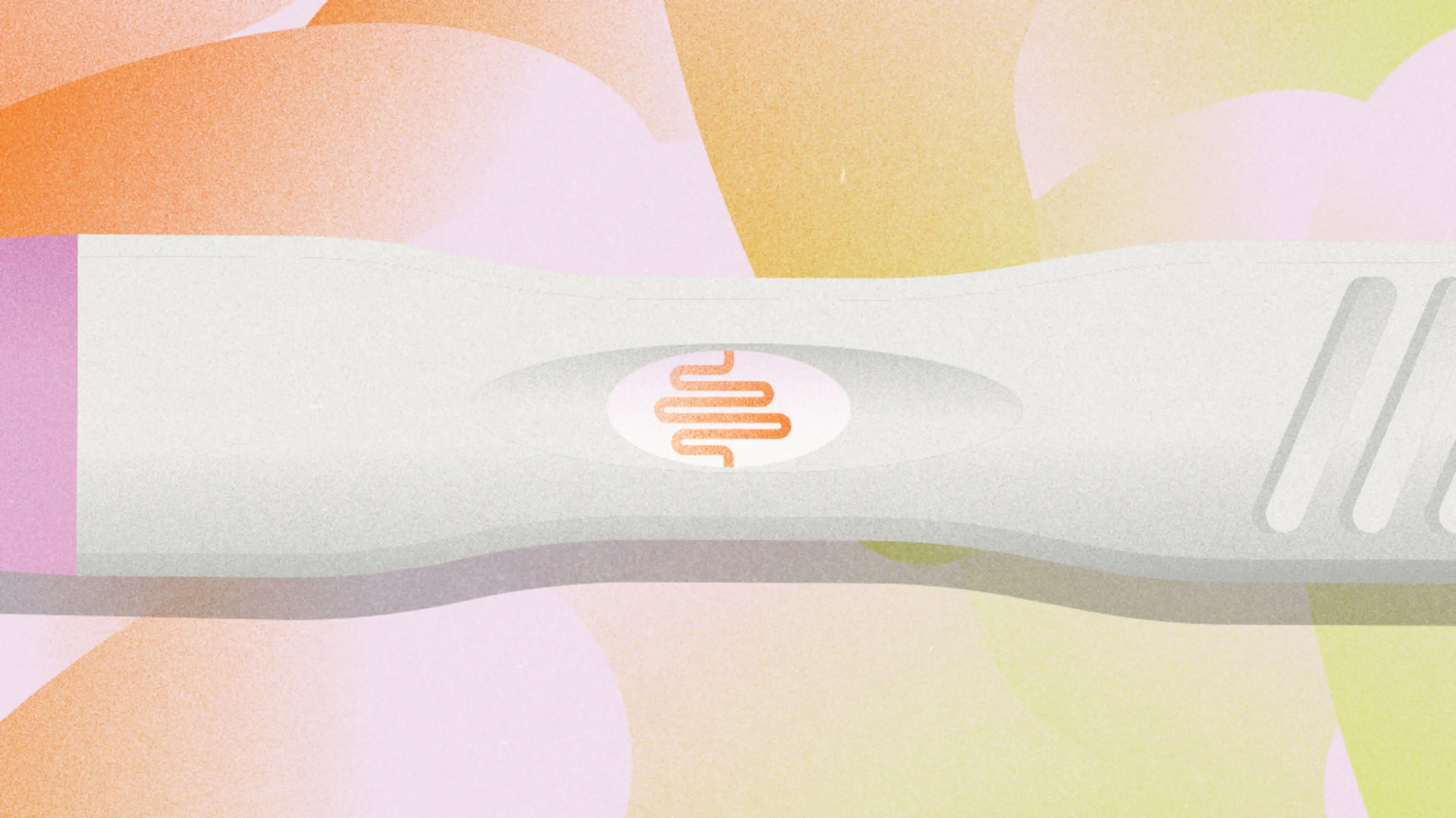With all the talk about gut health, the microbiome, and the absolute boom in products that claim to help heal your gut (you can buy everything from gut-healthy soda to yogurt and supplements these days), it’s worth taking a look at how all of those tiny bacteria that call your body home really affect your overall health, including your fertility.
First, a quick rundown of what the term microbiome actually means. Your body has a unique mix of bacteria that lives everywhere from your skin to your insides, but the bacteria that makes up the intestines is most important to gut health. While they’re too tiny to see with the naked eye, all those little bugs amount to two to five pounds1 of your overall weight. There are thousands of species that have specialized roles in the body—for example, breast-fed babies have an abundance2 of a type called Bifidobacteria that helps them digest breast milk. Some of these strands are beneficial, helping the body to digest fiber3 , among other things, while an overgrowth for certain types can lead to uncomfortable digestive symptoms and even health conditions like Small Intestinal Bacterial Overgrowth, (SIBO), which is an imbalance of the bacteria that colonizes the gut.
But what does all of this have to do with trying to conceive? Potentially, a lot, though much more research is needed. For now, experts are continuing to find that fertility and gut health seem to be intertwined. Studies have linked gut health with everything from hormones and how the body absorbs nutrients to inflammation and your immune system. Because the gut plays such a major role in the overall function of the body, it’s no surprise that some experts recommend paying close attention to it for your best possible fertility health.
“Optimizing your gut health BEFORE conceiving can actually lead to fewer pregnancy complications, an overall healthier pregnancy and a healthier baby,” says Taryn Mattern, registered dietitian and Founder and CEO of Healthfully Nourished. It’s worth noting that gut issues do not automatically mean fertility or pregnancy issues, but, there’s really no harm in improving your gut health, especially given what we do know.
How Poor Gut Health May Be Linked to Fertility Problems
How your microbiome impacts you is complicated and there is still a lot to learn. Here is what we know so far about how an imbalance in gut bacteria could affect your fertility health.
It may cause hormone imbalances
Poor gut health could have far-reaching effects when it comes to making a baby, starting with your hormones. A dysregulated gut may lead to hormone imbalances4 , like too much estrogen compared to progesterone, if the body isn’t properly excreting the hormone. “Certain bacteria influence levels of estrogen which can impact follicle development in the ovary, endometrial lining development, implantation, and early pregnancy,” says Dr. Kelsey Stang, a naturopathic physician. An imbalance in these all-important hormones can mean trouble when it comes to whether the body ovulates, how long the luteal cycle lasts, and even whether a fertilized egg can attach to the uterus.
It could impact health conditions, like PCOS and endometriosis
The effects of gut health on fertility may be especially important when it comes to reproductive health conditions, like Polycystic Ovary Syndrome (PCOS). PCOS comes with a number of possible symptoms, but hormonal imbalances and lack of ovulation (or, frustratingly, unpredictable ovulation) can make getting pregnant hard. While the connection is still being investigated, researchers are looking at whether boosting gut diversity5 in people with PCOS is a viable treatment option.
An imbalance in the gut microbiome may also play a role in endometriosis6 , potentially causing recurring bacterial infections, such as bacterial vaginosis or vaginal candida overgrowth. PCOS, endometriosis, and hormone imbalances can make menstrual cycles more irregular, which can make nailing down the timing of ovulation and intercourse more difficult. The thought is that by addressing gut imbalances, you might also improve these reproductive health conditions—or at least ease some of the worst symptoms— making it easier to conceive.
Chronic inflammation may be at play
Then there is inflammation. “About 70 percent of our immune system function is in our gut, [bacterial imbalances] can cause immune dysregulation and cause systemic inflammation, creating fertility challenges for many women and couples,” says Dr. Stang. Research7 suggests that constant inflammation in the body could disrupt the menstrual cycle, make it more difficult for the egg to implant in the uterine lining, and even contribute to miscarriage. Inflammation is also bosom buddies with endometriosis, which is considered an inflammatory disease8 , so it’s hard to say in that case whether the inflammation is affecting fertility or the endometriosis itself.
Either way, treating an imbalanced gut with an anti-inflammatory diet might be one way to reduce inflammation and boost your chances of getting pregnant.
You may have trouble getting proper nutrition
Poor gut health may affect your fertility in less obvious ways. A gut that isn’t functioning properly can have a harder time absorbing nutrients from food, meaning the all-important nutrients your body needs to run smoothly—and build a baby—aren’t being stored. If blood tests have shown low folate or B12 despite consuming it in adequate levels, your gut absorption may be to blame. “Our digestive system is responsible for absorbing nutrients from foods we eat. If there are imbalances or issues with absorption, that can lead to nutrient deficiencies which can cause hormone imbalances, poor cellular health (egg quality) and impact healthy immune function, potentially leading to inflammation,” says Dr. Stang.
It may affect your mental health
Trying to conceive can be stressful enough on its own, without the added impact that poor gut health can have on your mood. The gut plays a leading role in supporting mental health, and is often called “the second brain” becasue of a two-way communication network called the gut-brain axis. An unhealthy gut—one full of inflammation or imbalanced microbes—sends distress signals to the brain.
Gut bacteria even impacts neurotransmitters in the brain, which helps regulate our mood. “Improving gut health directly supports mood for many of my patients and it can make the TTC journey less of an emotional burden when neurotransmitters, hormones, and inflammation are more regulated,” says Dr. Stang. “It can also go the other direction though – stress from a fertility journey can contribute to gut imbalances (conditions like leaky gut or dysbiosis),” she adds.
Signs of Poor Gut Health
Regardless of the research that still needs to be done, taking steps to improve your gut health certainly won’t hurt you (and could really help!). But how do you even know if this is a problem you should focus on? Sometimes, it’s obvious when gut health is impaired: think bloating, constipation, diarrhea, and upset stomach. Another tip? Take a look at your daily, ahem, habits. Dr. Stang says that women with a healthy gut should have one to three well-formed bowel movements a day.
Other signs are a little more hidden. “I’m also looking for symptoms such as skin issues like acne or rashes, brain fog, fatigue, hormonal imbalances, low mood, autoimmune disease(s), a weakened immune system, allergies, or even weight loss resistance. Any of these symptoms can raise a red flag for potentially poor gut health,” said Mattern.
Even bloating is something that should be taken seriously, explains Dr. Stang. “I have treated many fertility clients with zero significant gut symptoms who, on comprehensive testing, have numerous issues.”
How to Support a Healthy Gut
Fortunately, supporting gut health can be as simple as changing your eating habits and adding in gut boosting nutrients. Surprise! That doesn’t mean you have to buy all the expensive “gut healing” products on the market. A simple diet rich in healthy fats, whole grains, vegetables, fruits, seeds, and nuts is full of antioxidants and fiber, and has been shown to support gut health and boost fertility, explains Mattern.
“Eating the rainbow with a lot of plant variety and diversity will help feed your good gut flora, positively impacting your microbiome while also giving you minerals, nutrients, and antioxidants that your body needs for optimal egg quality and to support your reproductive hormones,” she continues. Some studies have linked these types of foods, which are often eaten in the Mediterranean Diet, to improved fertility9 .
Supplementing with probiotics can diversify the microbiome and be beneficial, but so can adding in natural sources of probiotics in the form of fermented foods like kimchi, sauerkraut, miso, and yogurt. Pay attention to your blood sugar levels, too, in order to support ovulation and hormone balance. “A good goal is to aim to consume protein, healthy fats, and fiber every three to four hours,” suggests Mattern.
Whatever you eat, consider slowing down. Chewing food thoroughly stimulates digestive enzymes in the saliva as well as stomach acid production. Together, these help break down food so your body is better able to digest and use the nutrients from the food you eat. “Try taking three deep breaths before your first bite of food and chew each bite 33 times. Think of this as an invitation for nourishing your body, not a to-do list item!” says Dr. Stang.
Stress-reducing practices can improve digestion, too. “During stressful times, the body will move blood, oxygen, and resources away from the digestive tract as a “fight or flight response.” High levels of stress (especially chronic stress) can negatively impact your digestion as well as your reproductive hormones,” explains Mattern. When cortisol—the stress hormone—is high, progesterone production is decreased, but progesterone is important for getting and staying pregnant. Walks, meditation, and engaging in hobbies can all help to reduce stress.
Adding in yet another health concern on top of your fertility journey can be overwhelming, but this doesn’t have to take over your life. In most cases, eating nutritiously, adding in sources of natural probiotics, and reducing stress can drastically improve gut health and, potentially, your fertility. Think of it as a step to improving your overall health, so you can be your best self whenever and however your pregnancy journey begins.











